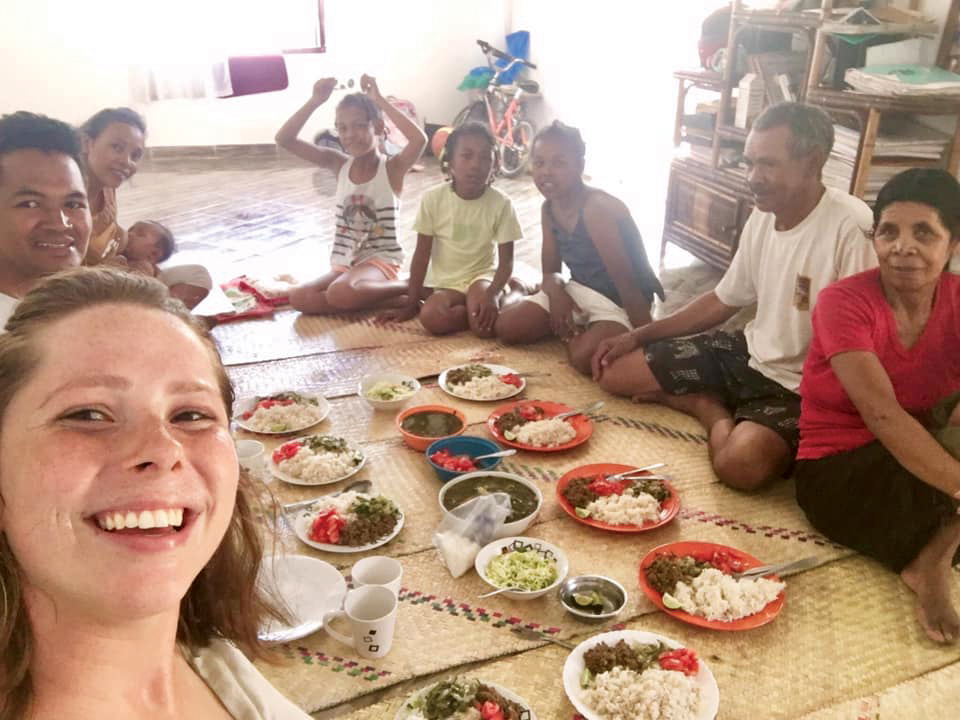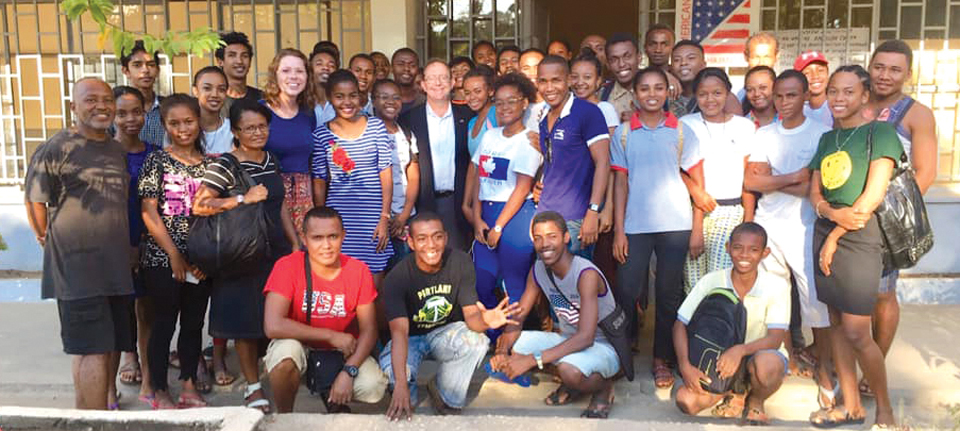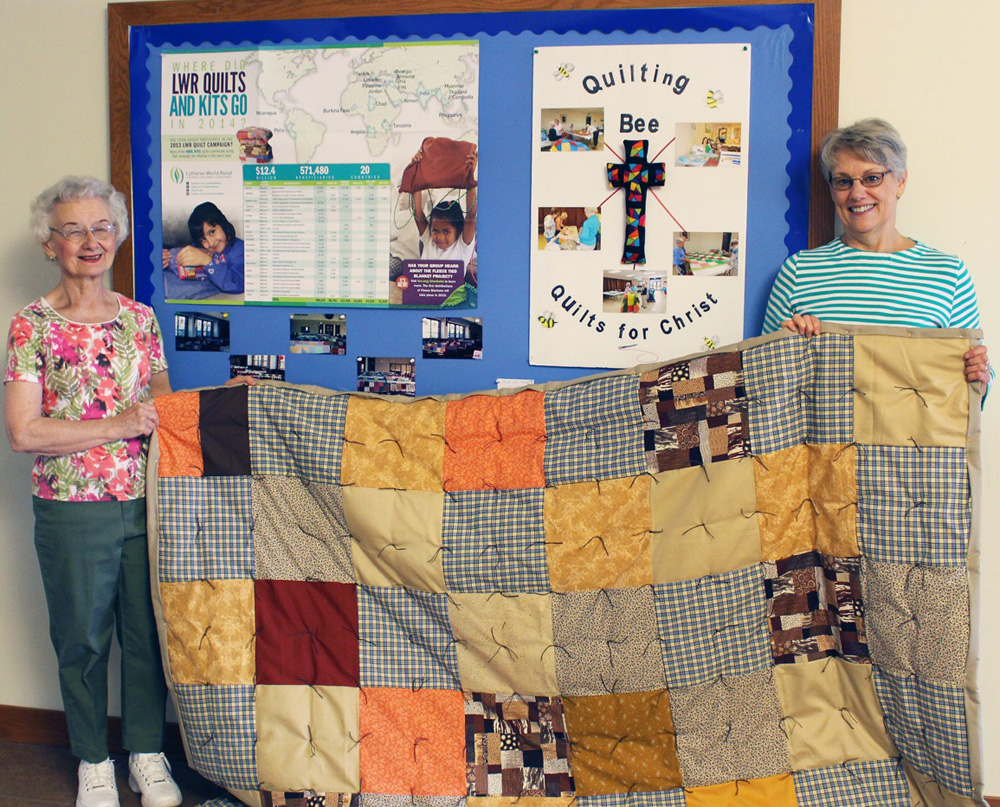Working for the world

As a young girl, Danielle Montecalvo of Greece always had an interest in visiting abroad. Danielle graduated from Spencerport High School in 2014. For her Senior High School project, she painted a six-foot by nine-foot World Map, which is still on display at Spencerport High School in the Language Arts hallway. “I was always interested in other countries and the different cultures around the world. I also knew I always wanted to travel the world,” Danielle said.
Danielle attended American University in Washington, D.C., graduating in May of 2018 with a double major in physics and international relations. According to American University, its students “distinguish themselves for their service, leadership, and ability to rethink global and domestic challenges and opportunities.”
“During college, I had a lot of interest in the Peace Corps, I knew I wanted to work for the Peace Corps after graduation,” Danielle said. The Peace Corps offers a range of opportunities for making a difference – from leading health campaigns to boosting local entrepreneurship to teaching digital literacy. Peace Corps volunteer opportunities are available in 60 countries around the globe. Volunteers are U.S. citizens at least 18 years of age, ready to depart in nine to 12 months. Service time is two years after three months of training. The work is ideal for college graduates, retirees, career changers, or anyone looking to make a difference in the world. For information on the Peace Corps, visit www.peacecorps.gov.
Danielle started her training with the Peace Corps in September of 2018, just four months after her college graduation. When applying for the Peace Corps, Danielle volunteered to go anywhere that her skills could best be utilized. Madagascar was selected as her service assignment, teaching English at the university level. Danielle has a passion for science and technology and can use these skills when teaching her students. Her first achievement was to learn the Malagasy language. The official languages of Madagascar are Malagasy and French, and there are several different dialects of the Malagasy language. “Although the dialects vary in the Malagasy language, everyone can be understood by each other,” Danielle said.
Danielle teaches at the university in the northwest city of Mahajanga; it is the fourth largest city in Madagascar. She said, “I love my life here; it is such an adventure. I live in an apartment close to my host family. Each Peace Corps member is assigned a host family that helps them adapt to the life and the culture in their assignment country. My goal here is to soak in as many new things as I can. My life here is not difficult. I did have a lot to adapt to, but, living in a big city, I enjoy many amenities that others in the rural areas don’t have. As a member of the Peace Corps, we are expected to live like we are a local.”
Madagascar, located off the coast of East Africa, is the world’s second-largest island country. It is the fourth-largest island in the world with numerous smaller peripheral islands. The island formed when it split from the Indian sub-continent millions of years ago, allowing native plants and animals to evolve in relative isolation. As a result, over 90 percent of its wildlife is found nowhere else on Earth. Despite a wealth of abundant and diverse natural resources, Madagascar is one of the world’s poorest countries. The economy is primarily based on agriculture, mining, and fishing. One of their best-known products is vanilla, which comes from an orchid grown on the island. More than two-thirds of the population in Madagascar live below the poverty line, with three-quarters of the people living in rural areas and only 13 percent of the population having access to electricity.
Danielle says life as a teacher in Madagascar has been an eye-opener. “Being a teacher is a privilege. In the classroom, I learn as much from my students as they learn from me. It is a privilege to share my knowledge and to learn from them. We are all intellectually motivated,” she said.
There are very few classroom computers available at the universities. Universities do have WiFi access, but only five to 10 percent of the students have access to computers. “The internet is the connection to the world, and it is an extremely important teaching tool,” Danielle said.
When researching ways to bring more computers to the schools, Danielle discussed with her director a successful past program that she learned about through her research. Danielle, with Ashley Thompson, a Peace Corps volunteer from South Carolina who teaches computer technology in Madagascar, started a project to purchase 73 computers from World Computer Exchange (WCE). WCE is a non-profit organization that provides refurbished computers at low cost to schools around the world. Danielle and Ashley set a goal to raise $18,914.98 to purchase the computers and distribute them to three schools – one high school and two universities – across the island of Madagascar. These computers will help the English and technology teachers improve their students’ computer literacy. They will be installed in computer labs and allow members of the school free access to worldwide information. The computers will be used for technology courses, mentorship programs, computer clubs, and general research.
The schools are preparing for the new equipment by creating pre-existing information courses for students. The teachers draw screens and keyboards on blackboards to give students visual aids of what to expect when using a computer. Schools have instituted plans to set money aside for the upkeep, maintenance, and security of the machines. Faculty members knowledgeable in computer repair are in place for maintenance purposes. The new computers will provide access to information and knowledge, allowing community members to be better able to participate in their world.
This coming November, Danielle’s Peace Corps volunteer work will end. She plans to return home to Greece for the holidays. “I really miss my family. After the holidays, I plan to return to Washington, D.C. I hope to work for the Federal Government. While in college, I did an internship with NASA, and with my love of science, it would be great to work there. Or maybe I will work in international relations, maybe even in Madagascar, since I am familiar with the language and the culture. The future is pretty open,” she said.
For more information, or to donate to Danielle’s Computers for Future Program, visit www.peacecorps.gov/donate/projects/computers-for-future-pp-20-684-003/






